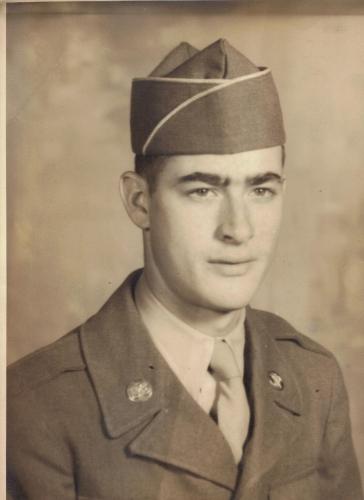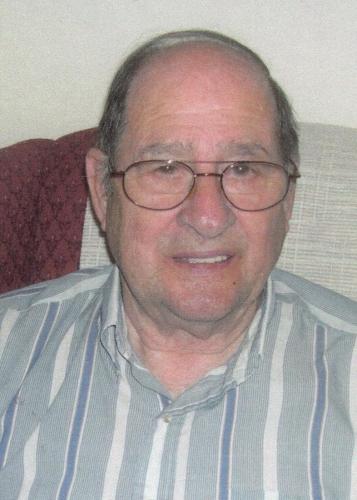Veteran Earl Spillman
Earl Spillman
Earl was born in Cumberland County, Virginia to Earl Spillman, Sr. and Marie Raymond on February 25, 1928, soon after the beginning of the great depression. His place of birth marks him as a Virginian through and through; Cumberland County is almost in exact center of the state.
Not only was his county in the center of the state, it was also in one of the most beautiful parts of the state. Near to his home was Bear Creek State Park, where his dad found employment during the depression as a supervisor in the Civilian Conservation Corps. Nearby also were Hampden Sydney College which in former years had been a partner with Union Presbyterian Seminary in the preparation of young men for the ministry, and Longwood University in Farmville which at that time was a state normal for the training of teachers, but is now a large co-educational institution offering more than 100 majors.

Earl had three brothers and three sisters growing up, with him being the third born child. Living in this kind of environment as a child probably is one reason that he has a great love for family which endures to this day. He says that his fondest memories are the family reunions he had with his brothers and sisters. It is remarkable also that here in the small retirement community where Earl now lives can be found two of his sisters, Betty Young and Jean Watlington. His older sister Anabel, the wife of Willard Burton, had also lived here until her death a few years ago.
He speaks of one traumatic experience of his childhood that has had an impact on his life. In 1935, when he was only seven years old, a tornado struck their home and just about completely destroyed it. Other than that, his memories of childhood seem to be that of a happy boy living on a farm, centering on family and friends. He remembers the good times he had at school, and playing ball on the sand lot, and coon hunting. He and his family enjoyed attending church at the historic Cumberland Presbyterian Church which was founded in 1754 and carries marks of the Civil War with several holes where cannon balls went through.
At school he loved basket ball and was on the school team. He remembers an elementary teacher named Annelaura Stone who played an important part in his life; she was a teacher of student teachers from nearby Longwood. He also remembers a neighboring family that lived nearby, and the large amount of time he spent with their 14 (!!!) children.
Earl's enlistment in the army in 1946 came about in a peculiar manner. He was already in the Virginia National Guard after high school, and was subject to being drafted into the army. However, an army recruiter convinced him that he could obtain special favors by enlisting before being drafted; he could choose Camp Lee which was fairly close for basic training and could choose to be in the Quartermasters Corps which he favored. With this in mind, he enlisted in in the army in 1946 and was sent to Camp Lee for basic training, but then on to artillery instead of the Quartermasters Corps. So much for the promises of recruiters.
From Camp Lee he went to Stoneman, California for overseas assignment, and arrived in the port of Inchon, South Korea in December, 1946 during a heavy snowstorm. He well remembers coming into the port on a barge at 6 PM, and waiting until midnight for a train to leave for Seoul. Arriving there they were taken to a previous Japanese army base which had no bunks, thus requiring that they sleep in their sleeping bags on the floor. He slept by a pane-less window, and awakened the next morning to find himself covered with blown in snow.
In Seoul he joined the 49th Field Artillery Company “B.” In May 1947 the 49th was decommissioned and he was assigned to the 337 Ordinance Company in Ascom City, Korea. to receive and stack supplies and equipment that had originally been meant to be used in the invasion of Japan, but instead had been left aboard liberty ships anchored out at sea for a couple of years. Much of this equipment was damaged by rust and had to be hauled back out to the Yellow Sea and dumped. While working there he was able to go week-ends on sight-seeing trips to various antique shrines and ancient locations, some of which were as much as 4000 years old.
He was discharged in 1948 but was called back to active duty in 1950 and again sent to Korea. He arrived there in the fall, joined the 522 Signal Construction Company. He got there about supper time, ate, and got on a truck to join a crew about 20 miles inland. The push from Pusan had begun. The main work of his unit was installing telephone lines from Pusan to Seoul.

He was discharged again in 1952 and obtained work with International Harvester, and married Marilyn Wheeler in September of that year. He was left without a job in 1955 when the International Harvester Refrigeration Division was sold, and worked for a time in hotels, but his career took a sharp turn in 1960 when he began work as a nursery manager in various organizations. This finally resulted in his being given the job of Nursery Manager for Southern States Corporation, the position from which he retired. During his time there he held a couple of call-in shows on BLABB-TV in which people would call to ask how to solve various kinds of horticulture problems. Each of these sessions lasted thirteen weeks.
Earl expressed admiration for the Korean people who, he said, were virtual slaves of the Japanese for about 40 years. He feels that his army experience was of great value to him; he learned lessons there that he could never have learned anywhere else. In the army he learned about people, and also his horizon was extended for an understanding of other parts of the world. He feels that he has been very blessed in life with friends, family, church, and his army experience. Asked what advice he would pass on to the younger generation, he said with emphasis, “Value what you have.”
We express our appreciation to Earl for the service he performed in behalf of our nation as a part of the U. S. Army during the Korean conflict.
As told to Dick Young